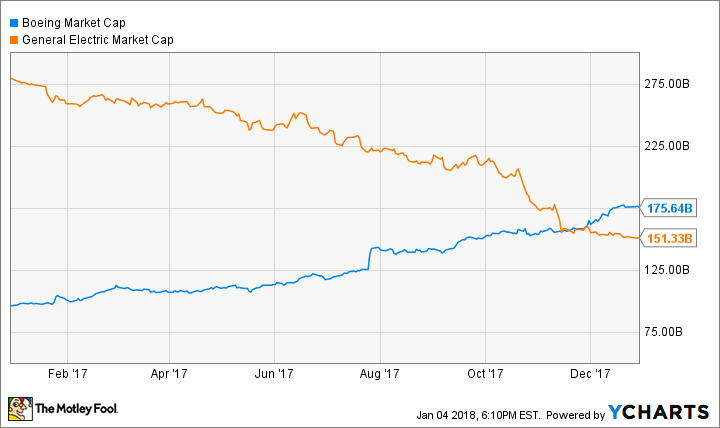During 2017, shares of aircraft manufacturing giant Boeing (BA 2.61%) surged 90%, lifted by rising free cash flow and a resurgence in aircraft orders following a downturn in 2016. This made it easily the biggest gainer in the Dow.
At the other end of the spectrum, General Electric (GE 2.54%) was the Dow's worst performer last year. GE stock plunged 45% as problems in the company's power unit, a big dividend cut, and a management shakeup caused investors to sour on the conglomerate's long-term prospects.
However, Boeing stock may be priced for perfection after its massive 2017 rally. Meanwhile, GE stock could rebound once investors recognize the strength and growth potential of its fast-growing aviation business.
The great reversal
The huge rally in Boeing shares last year vaulted its market cap past that of General Electric by the end of 2017, making Boeing the most valuable industrial company in the country. This development was particularly shocking because GE's market cap was nearly three times that of Boeing at the beginning of the year.
General Electric vs. Boeing Market Cap, data by YCharts.
The strange thing about this sharp divergence is that GE's largest business segment -- accounting for 46% of its total segment profit in the third quarter -- is its aviation division. GE Aviation gets most of its revenue from selling and servicing engines for commercial jets. Thus, its long-term growth prospects are intimately tied to those of Boeing and Airbus (EADSY 3.12%).
Positioned for growth
At GE's investor day back in November, management noted that aviation segment operating income is on track to rise 5%-6% in 2017 and 7%-10% in 2018. High single-digit growth could continue for quite a while.
First, Boeing and Airbus both plan to raise single-aisle jet output by about 20% over the next two years. Doing so will boost jet engine sales in GE's CFM joint venture. CFM is the sole engine supplier for Boeing's 737 MAX and holds more than 50% market share on the Airbus A320neo family. Second, the sustained rise in aircraft (and engine) production will supercharge growth of the installed base of GE and CFM engines and drive steady increases in high-margin service revenue.
Investors weren't too impressed by these investor-day revelations, as GE stock continued to slide in the following weeks.
Further production increases could be in the works
If a recent order surge at Airbus and Boeing is any indication, production of CFM engines could be poised to rise even further than previously expected. Just in the past month, Airbus has captured nearly 700 additional firm orders for A320neo-family aircraft. Boeing's 737 MAX also had a very good year in terms of new orders.
As a result, Airbus ended 2017 with roughly 5,700 A320neo-family firm orders in its backlog. It would take more than eight years to build that many jets, even at the 60-per-month production rate scheduled to take effect in mid-2019. Boeing's backlog is somewhat shorter but still represents more than seven years of production.

Production increases at Boeing and Airbus will boost GE's aviation segment. Image source: Boeing.
This situation could push both aircraft manufacturers to boost production even further after 2020 to meet airlines' insatiable demand for single-aisle planes. In that scenario, CFM's annual output could ultimately rise well beyond the 2,200-plus units that are likely to be delivered in 2020.
What about the rest of GE?
Boeing's valuation already seems to incorporate robust growth expectations. By contrast, GE stock has sagged so far that the company's market cap was just $151 billion at the end of 2017. But based on the aviation segment's expected 2018 segment profit of about $7 billion and its strong growth trajectory, the aviation business alone could be worth $100 billion.
The rest of General Electric is surely worth more than $51 billion. GE plans to simplify its business to focus on aviation, power, and healthcare. As a result, it expects to bring in more than $20 billion of asset sale proceeds related to exiting non-core businesses.
Selling or spinning off its stake in Baker Hughes could net another $20 billion at the company's current valuation -- and a lot more if oil and gas drilling activity continues to rise.
Lastly, despite the power segment's recent struggles, GE is likely to reap a combined operating profit of nearly $7 billion from its power (including renewables) and healthcare segments in 2018.
In other words, investors are either grossly underestimating the value of GE's aviation segment or writing off the rest of its core business entirely. As strong aircraft demand drives a return to earnings growth at General Electric beyond 2018, GE stock could come roaring back.






